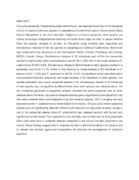| dc.description.abstract | The exotic parasitoid, Phaedrotoma scabriventris Nixon, was imported from Peru for the biological control of invasive Liriomyza species in vegetable and ornamental crops in Kenya where Opius dissitus Muesebeck is the most abundant indigenous Liriomyza parasitoid. Both species are solitary larva-pupal endoparasioids attacking the same larval stage. In order to assess whether these two species compete or co-exist, an interaction study involving sole, sequential and simultaneous releases of the two species on polyphagous Liriomyza huidobrensis (Blanchard) was conducted in the laboratory at the International Centre of Insect Physiology and Ecology (ICIPE), Nairobi, Kenya. Simultaneous releases of 50 individuals each of the two parasitoids resulted in significantly higher total parasitism rate (61.96 ± 4.60) than in the single release of P. scabriventris (34.94 ± 8.50). Simultaneous release of 25 individuals of each species resulted in a parasitism rate (44.52 ± 2.75) similar to that obtained for single releases of 50 individuals of O. dissitus (42.57 ± 3.35) and P. scabriventris (34.94 ± 8.50). No significant effect was observed in total parasitism between sequential and single releases of 50 individuals of each species. The specific parasitism rate of each parasitoid species in the simultaneous release of 50 individuals of each species was not significantly different from when each species was released alone. The first introduced parasitoid in sequential releases achieved the same parasitism rate as when released alone. However, the second released species gave a significantly lower parasitism rate than when released alone and compared to the first released species. The F1 progeny sex ratio was balanced for P. scabriventris but male-biased in O. dissitus. The sex ratios of both parasitoid species were not significantly affected, neither in simultaneous nor sequential releases, except in one of the sequential release where P. scabriventris was released second, with its sex ratio significantly female-biased. Non-reproductive host mortality was not important for both parasitoids when used alone and in combined releases compared to the natural mortality observed in the control. These findings suggest that P. scabriventris has no detrimental effect on O. dissitus and its release into Kenya's agricultural ecosystems will enhance the management of Liriomyza leafminer. | en_US |
